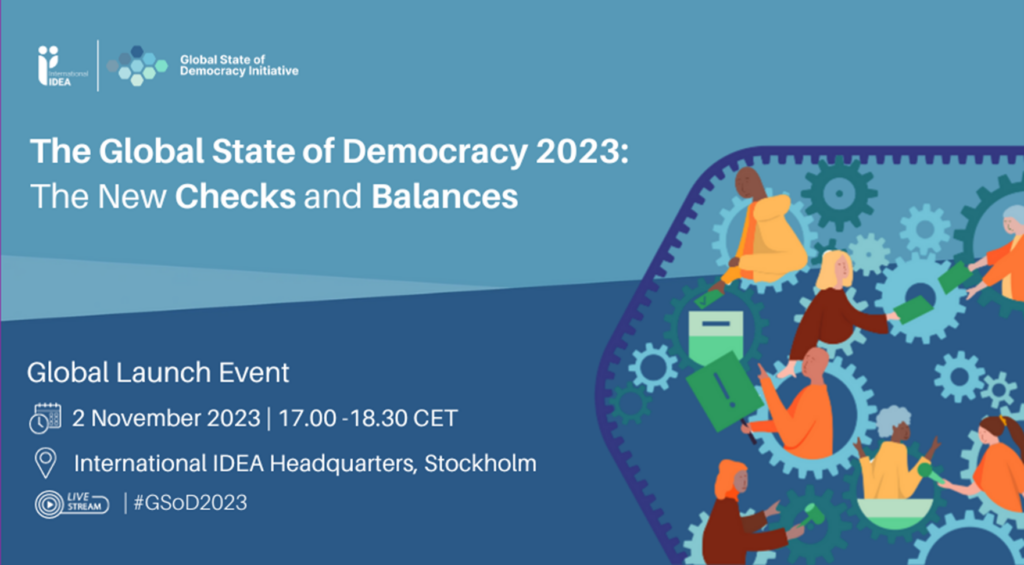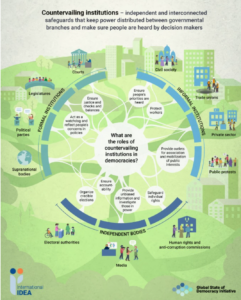 Half of the world’s countries are suffering democratic decline, ranging from flawed elections to curtailed rights including freedoms of expression and assembly, an intergovernmental watchdog group said on Thursday, Reuters reports:
Half of the world’s countries are suffering democratic decline, ranging from flawed elections to curtailed rights including freedoms of expression and assembly, an intergovernmental watchdog group said on Thursday, Reuters reports:
In its annual report, the Stockholm-based International Institute for Democracy and Electoral Assistance (IDEA) said 2022 was the sixth consecutive year in which countries with net declines outnumbered those with net advances, the longest consecutive fall since its records began in 1975….The think-tank said the deterioration of democratic guard-rails such as elections, parliaments and independent courts had led to problems in safeguarding the rule of law and holding politicians to account.
One in every two states – 85 out of 173 countries – experienced a decline in at least one

National Endowment for Democracy (NED)
indicator of democracy between 2017 and 2022, the report states.
Autocratic and illiberal governance by the likes of Turkey’s Recep Tayyip Erdoğan and Hungary’s Viktor Orbán in Hungary has accelerated the democratic downturn over the past few years, the report states, adding that “the erosion of democratic norms has been engineered by leaders claiming to speak in the name of, and with the authority of, the people.”
“In short, democracy is still in trouble, stagnant at best, and declining in many places,” IDEA Secretary-General Kevin Casas-Zamora said. “But while many of our formal institutions like legislatures are weakening, there is hope that these more informal checks and balances, from journalists to election organizers and anti-corruption commissioners, can successfully battle authoritarian and populist trends.”
 Multiple crises have battered the world, but inspirational wins in gender equality, indigenous communities’ rights, the fight against corruption, and enforcement of the rule of law are important flags marking the path forward, adds Seema Shah, the head of IDEA’s Democracy Assessment Unit:
Multiple crises have battered the world, but inspirational wins in gender equality, indigenous communities’ rights, the fight against corruption, and enforcement of the rule of law are important flags marking the path forward, adds Seema Shah, the head of IDEA’s Democracy Assessment Unit:
Countervailing institutions have proven to be pivotal in the area of public participation as well. Our latest data reveal that people’s enthusiasm for public engagement is thriving, even in seriously challenging contexts. Civil society’s work to mobilize people, represent public concerns in advocacy campaigns and through public interest litigation, as well as the public’s own advocacy efforts reveal an abiding demand for democracy.
The six-year decline is the longest consecutive period of deterioration — in which countries with net declines outnumbered those with net advances across a range of metrics — since records started being kept in 1975, Shah told POLITICO. “We haven’t seen that before,” Shah said, “the very foundational building blocks of democracy are under threat.”
International IDEA makes a series of recommendations to encourage and maintain democracies, including:
- take action to defend electoral processes;
- encourage parliaments to “increase opportunities for public participation and transparency”;
- governments should consult with the judiciary to create mechanisms to denounce and sanction acts that undermine judicial integrity, and ensure that prosecutors are independent;
- counteracting the continuing serious deterioration of the freedoms of expression, association, and assembly; and defending the work of the media and civil society.
Civic society should take the lead in conducting assessments of the protection of basic rights and ensure the existence of a robust and impartial mechanism to receive complaints of rights violations, the report adds. RTWT
@JoDemocracy‘s founding co-editor echoes the findings of the latest @Int_IDEA survey of global democracy. https://t.co/27vW9KLsnS
— Democracy Digest (@demdigest) November 2, 2023







